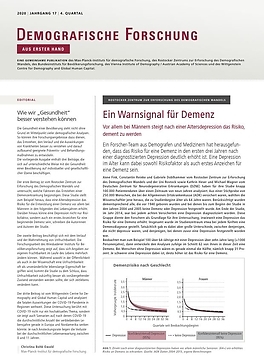December 09, 2020 | Defo News
How Depression at Older Ages and Dementia are Related

© MPIDR
The new issue (No. 4/2020) of Demografische Forschung Aus Erster Hand, the popular science newsletter with latest research results from demography, has been released.
The Newsletter is available in German only.
"Demografische Forschung Aus Erster Hand" is a joint publication of the Max Planck Institute for demographic Research (MPIDR), the Rostocker Zentrum zur Erforschung des Demografischen Wandels (RZ), the Vienna Institute of Demography (VID), the Wittgenstein Centre for Demography and Global Human Capital and the Federal Institute for Population Research (BiB).
The topics of the new issue are:
1. A warning sign of dementia
Dementia risk increases after depression at older ages, especially among men
(from Rostocker Zentrum zur Erforschung des Demografischen Wandels)
A research team of demographers and medical professionals has found that the risk of suffering from dementia significantly increases in the first three years following depression diagnosis. Depression at older ages can be both a risk factor and the first sign of dementia.
2. Infertile –but only temporarily?A good ten percent of Germans believe for a time that they cannot have children of their own
(from Federal Institute for Population Research)
“Infertility” is often seen as an immutable fact both in demography and in the public eye. Yet, many young people who initially consider themselves infertile do have children of their own later on in life. The perception of one's own ability to procreate must thus be understood as a trait that can change – a number of times – over the life course, says a study by the Federal Institute for Population Research.
3. How many years of life does COVID-19 cost?
The pandemic will likely reduce life expectancy, especially in Europe and North America
(from Wittgenstein Centre for Demography and Global Human Capital)
The SARS CoV-2 virus has already claimed 1.5 million deaths worldwide. And many more will follow. It is still difficult to assess whether, an if so, how strongly the pandemic will affect life expectancy in the various regions of the world. Still, a new study from Vienna succeeds in presenting first scenarios.
The newsletter is released four times a year and is available electronically and as a printed version and is free of charge.
All past issues are available online on the Newsletter website. On the website you also have the possibility to subscribe to the Newsletter to get informed about the release of the new issues or to receive the printed versions by mail.